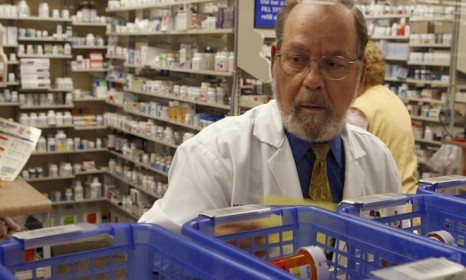The 'unprecedented' plunge in prescription drug prices
When patents for drugs like Lipitor and Plavix expire over the next two years, prices will drop as generics flood the market

A free daily email with the biggest news stories of the day – and the best features from TheWeek.com
You are now subscribed
Your newsletter sign-up was successful
Dozens of patents for name-brand drugs are due to expire within the next 14 months, and generic drugs will replace some of the most popular and widely advertised drugs used today. For millions of people worldwide, this means switching from familiar brands like Lipitor to generic equivalents. How will this affect drug companies, and what will be the impact on people who depend on expensive prescription medication? Here, a brief guide:
Which drugs are scheduled to go generic?
Some real blockbusters. "In the next two years, six of the 10 top-selling drugs will lose their patents," says Chris Woolston in the Los Angeles Times. Lipitor, the world's best-selling drug, which is used to lower cholesterol, will be available as a generic in November of this year. Another best-seller, the blood thinner Plavix, will lose its patent in May 2012. Other well-known drugs with expiring patents include the arthritis treatment Enbrel, the anti-psychotic Zyprexa, as well as drugs for bipolar disorder, HIV, high cholesterol, and other conditions.
The Week
Escape your echo chamber. Get the facts behind the news, plus analysis from multiple perspectives.

Sign up for The Week's Free Newsletters
From our morning news briefing to a weekly Good News Newsletter, get the best of The Week delivered directly to your inbox.
From our morning news briefing to a weekly Good News Newsletter, get the best of The Week delivered directly to your inbox.
Why is this happening all at once?
In the 1990s, pharmaceutical researchers were "wildly successful at creating pills that millions of people take every day for long-term conditions," says the Associated Press. The patents, which were filed while the drugs were still being developed, generally last for about 20 years before expiring, so many drugs that were created in the 1990s will probably be available as generics in the next few years.
Will this result in significantly lower drug prices?
Yes. Generics typically cost 20 to 80 percent less than brand-name drugs. That's a "godsend" for people with chronic conditions like arthritis, high cholesterol, diabetes, and other illnesses — especially if these people have no prescription coverage. Hospitals, nursing homes, and long-term-care facilities will also benefit, since "using lower-priced generics will save them some money." Overall, the use of generics "saved the U.S. health-care system more than $824 billion from 2000 through 2009," says National Journal.
A free daily email with the biggest news stories of the day – and the best features from TheWeek.com
What about the impact on Big Pharma?
"The profit dollars that companies used to reinvest in innovation are no longer going to be coming," says pharma consultant Terry Hisey, as quoted by the Associated Press. That raises "long-term concerns about the industry's ability to bring new medicines to market." Drug companies have already started laying off employees, and more belt-tightening is expected to occur.
Sources: Associated Press (2), LA Times, National Journal
-
 Key Bangladesh election returns old guard to power
Key Bangladesh election returns old guard to powerSpeed Read The Bangladesh Nationalist Party claimed a decisive victory
-
 Judge blocks Hegseth from punishing Kelly over video
Judge blocks Hegseth from punishing Kelly over videoSpeed Read Defense Secretary Pete Hegseth pushed for the senator to be demoted over a video in which he reminds military officials they should refuse illegal orders
-
 Trump’s EPA kills legal basis for federal climate policy
Trump’s EPA kills legal basis for federal climate policySpeed Read The government’s authority to regulate several planet-warming pollutants has been repealed
-
 5 recent breakthroughs in biology
5 recent breakthroughs in biologyIn depth From ancient bacteria, to modern cures, to future research
-
 Bacteria can turn plastic waste into a painkiller
Bacteria can turn plastic waste into a painkillerUnder the radar The process could be a solution to plastic pollution
-
 Scientists want to regrow human limbs. Salamanders could lead the way.
Scientists want to regrow human limbs. Salamanders could lead the way.Under the radar Humans may already have the genetic mechanism necessary
-
 Is the world losing scientific innovation?
Is the world losing scientific innovation?Today's big question New research seems to be less exciting
-
 Breakthrough gene-editing treatment saves baby
Breakthrough gene-editing treatment saves babyspeed read KJ Muldoon was healed from a rare genetic condition
-
 Humans heal much slower than other mammals
Humans heal much slower than other mammalsSpeed Read Slower healing may have been an evolutionary trade-off when we shed fur for sweat glands
-
 Scientists map miles of wiring in mouse brain
Scientists map miles of wiring in mouse brainSpeed Read Researchers have created the 'largest and most detailed wiring diagram of a mammalian brain to date,' said Nature
-
 Scientists genetically revive extinct 'dire wolves'
Scientists genetically revive extinct 'dire wolves'Speed Read A 'de-extinction' company has revived the species made popular by HBO's 'Game of Thrones'